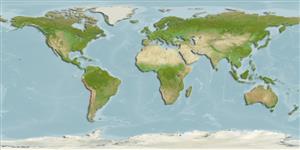Preferred temperature (Ref.
115969): 14.6 - 23.1, mean 18.5 (based on 30 cells).
Phylogenetic diversity index (Ref.
82804): PD
50 = 0.5312 [Uniqueness, from 0.5 = low to 2.0 = high].
Bayesian length-weight: a=0.00955 (0.00834 - 0.01093), b=3.06 (3.02 - 3.10), in cm Total Length, based on LWR estimates for this species (Ref.
93245).
Mức dinh dưỡng (Ref.
69278): 4.5 ±0.3 se; based on diet studies.
Thích nghi nhanh (Ref.
120179): Trung bình, thời gian nhân đôi của chủng quần tối thiểu là 1.4 - 4.4 năm (K=0.15; tm=2).
Prior r = 0.51, 95% CL = 0.33 - 0.76, Based on 1 data-limited stock assessment.
Fishing Vulnerability (Ref.
59153): Moderate vulnerability (36 of 100).
Climate Vulnerability (Ref.
125649): High to very high vulnerability (71 of 100).
